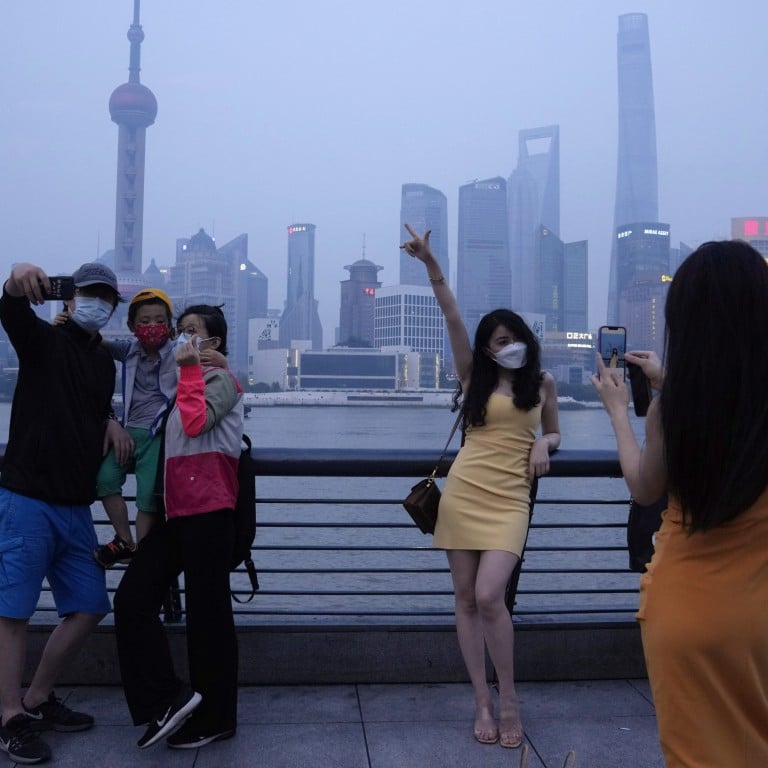
Coronavirus: as Shanghai reopens, South Korean firms race to shake off lockdown disruptions
- South Korean companies in Shanghai or with exposure to its supply chain are trying to get business back on track after lockdown was lifted
- From small traders to some of South Korea’s top conglomerates, China’s hardline coronavirus containment policy has taken a toll
Park Sang-min, a South Korean businessman based in the commercial hub, said many companies involved in trade like his own had lost business partners during the lockdown, when cargo-handling capacity at the city’s port plunged.
The city’s port, the world’s biggest based on cargo throughput, handled 17 per cent fewer containers in April compared with the same month of 2021, data from Shanghai International Port Group shows.
As Park’s company was unable to ship parts and materials overseas over the past two months, business partners in Europe and Northern Africa found other companies shipping goods from regions of China not under lockdown.
It was two months of shipments of orders being delayed or cancelled
Payments for some orders delivered before the lockdown were also suspended because banking services were halted.
“It was two months of shipments of orders being delayed or cancelled, but this takes a significant toll that goes beyond earnings,” Park said. “We have to find business partners to substitute for those that we lost.”
Government subsidies are available for companies whose business has been affected, but his firm may not be eligible, he said.
Park, who is vice-chairman of the Korea Chamber of Commerce in Shanghai, said the group was still investigating how members had been affected by the lockdown.
“The toll was greater for the self-employed such as those running restaurants, as they could not operate because all indoor operations with the exception of hospitals, pharmacies and grocery stores had to close,” said Park Min-young, chief representative of the Korea International Trade Association Beijing Office.
South Korea’s top conglomerates could not escape the effects of the lockdown, either, as their factories or suppliers in Shanghai shut down.
Food product manufacturers Nongshim and Orion, as well as cosmetics giants such as LG H&H and Amorepacific, had operations suspended for a period during the lockdown.
Nongshim, one of the world’s largest producers of instant noodles, had its Shanghai factory closed from March 28 to April 11.
‘Severe economic hit’ from Shanghai lockdown felt across Yangtze River Delta
“The plant has reopened partially since then, but the factory is not operating at full capacity yet,” a Nongshim spokesman said, stating it takes time for factories to fully resume operations after a shutdown.
The company was able to get products to market because it has another factory in Shenyang, which was not under lockdown, the spokesman said. But sales are projected to be down.
“We are looking into the scale of damage,” he said.
Amorepacific had operations at its Shanghai factory suspended in April.
Given the cosmetic company’s key sales channels include retail shops, which were closed during lockdown, sales are likely to have been affected.
The company declined to comment on the issue, but revenue generated from China accounted for 69.9 per cent of its total overseas revenue in 2021.
LG’s household product unit also relies on income from China for overseas earnings.
Revenue generated from cosmetic sales in China accounted for 57.75 per cent of LG H&H’s total overseas revenue last year.
China is South Korea’s third largest investment destination, with investments totalling US$6.61 billion last year.
China unveils detailed stimulus plan to shore up virus-ravaged economy
There were 28,159 South Korean businesses operating in China as of June 2021, according to data from the Export-Import Bank of Korea.
Companies based in South Korea with business partners in China have also experienced supply chain disruptions.
A survey by the Federation of Korean Industries of 700 companies that have invested in China and are engaging in business transactions with the mainland showed 50.9 per cent experienced disruptions in securing raw and subsidiary materials, and 14.9 per cent saw delays in deliveries. Another 13.6 per cent said they experienced disruptions to production.
The survey, which was conducted in the first week of May, showed companies on average saw a 4 per cent fall in revenue and 3.7 per cent drop in export value when compared to the month before and after lockdowns in major cities.
At the same time, production costs rose by 2.4 per cent.



_1.jpg?itok=FxuA75op)